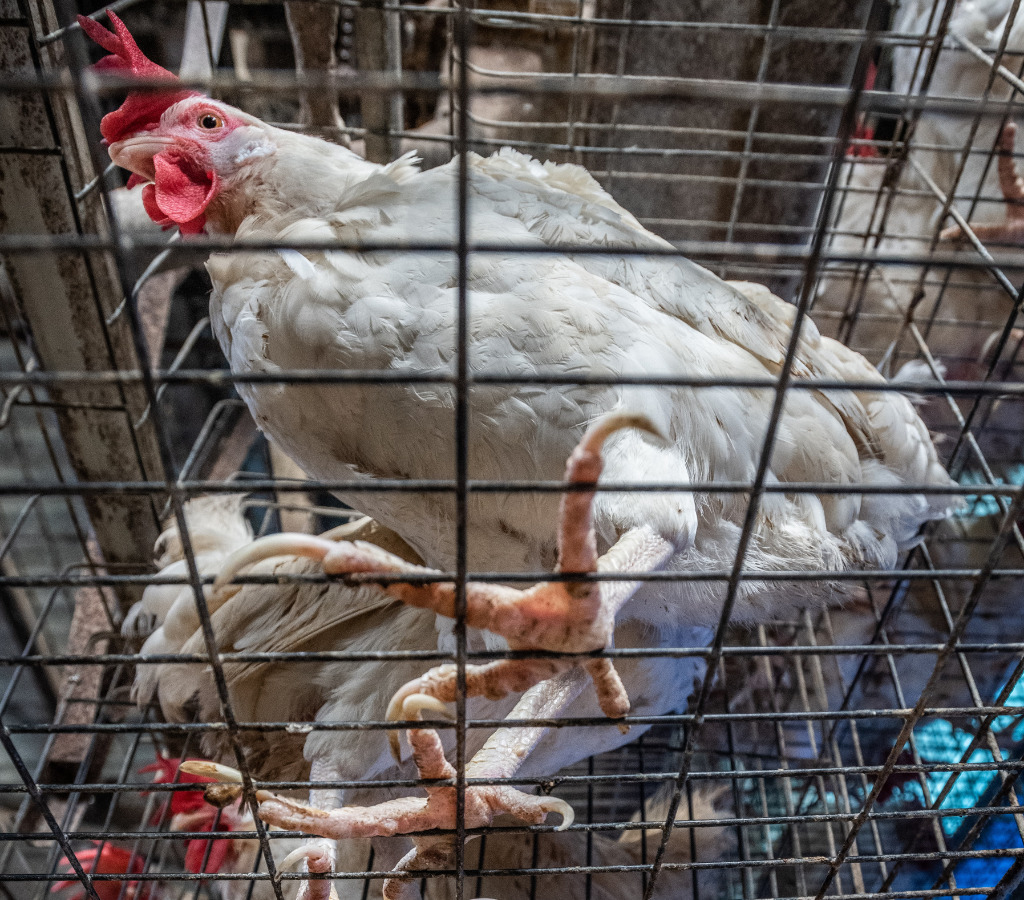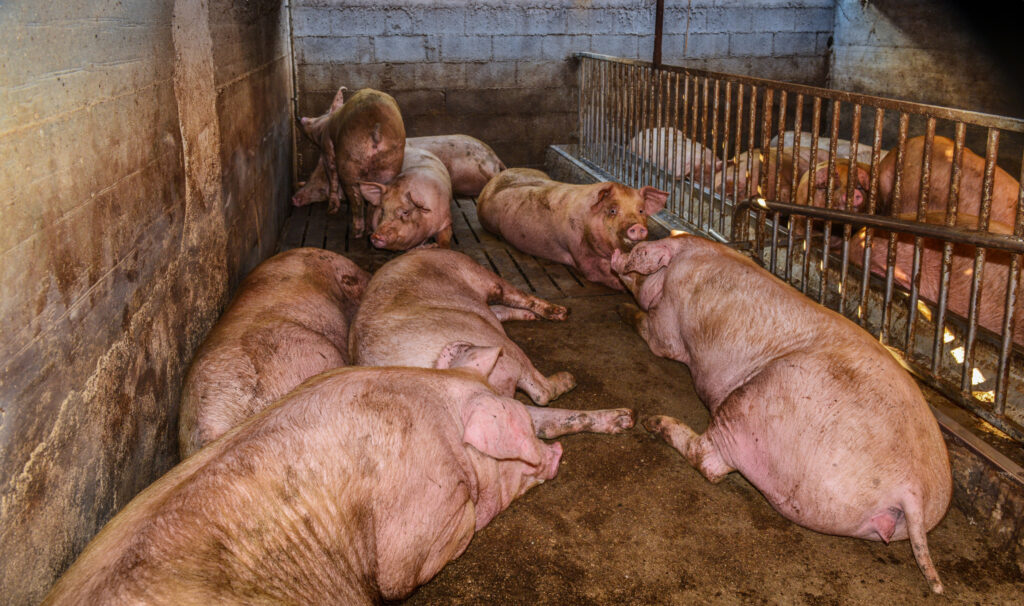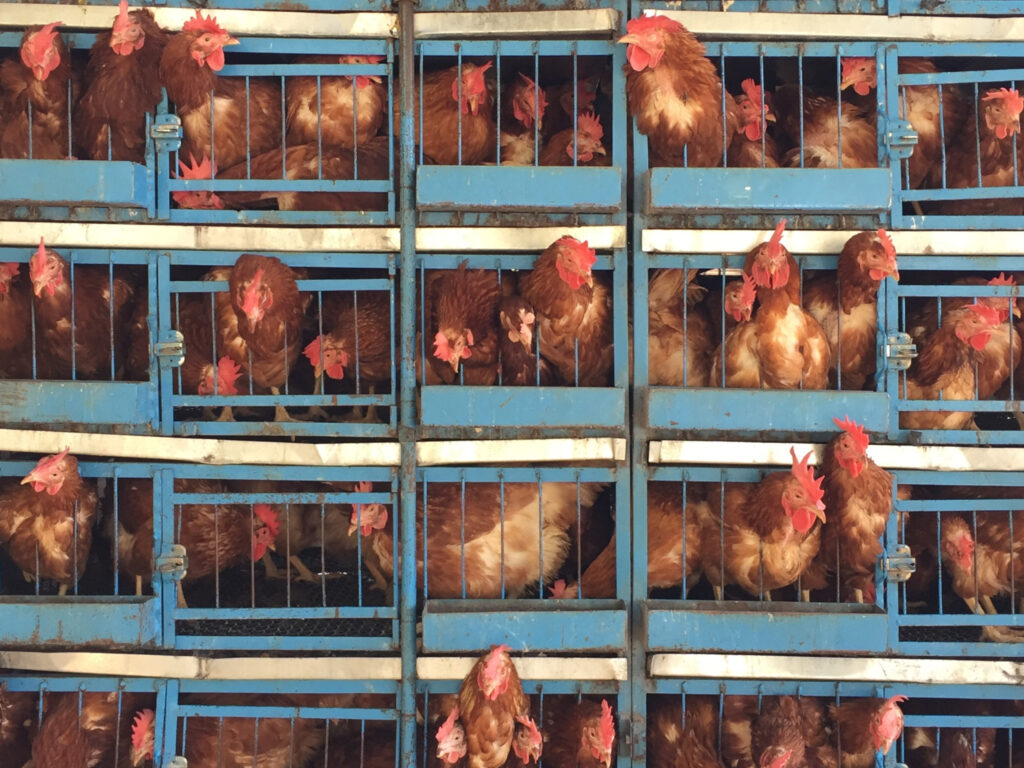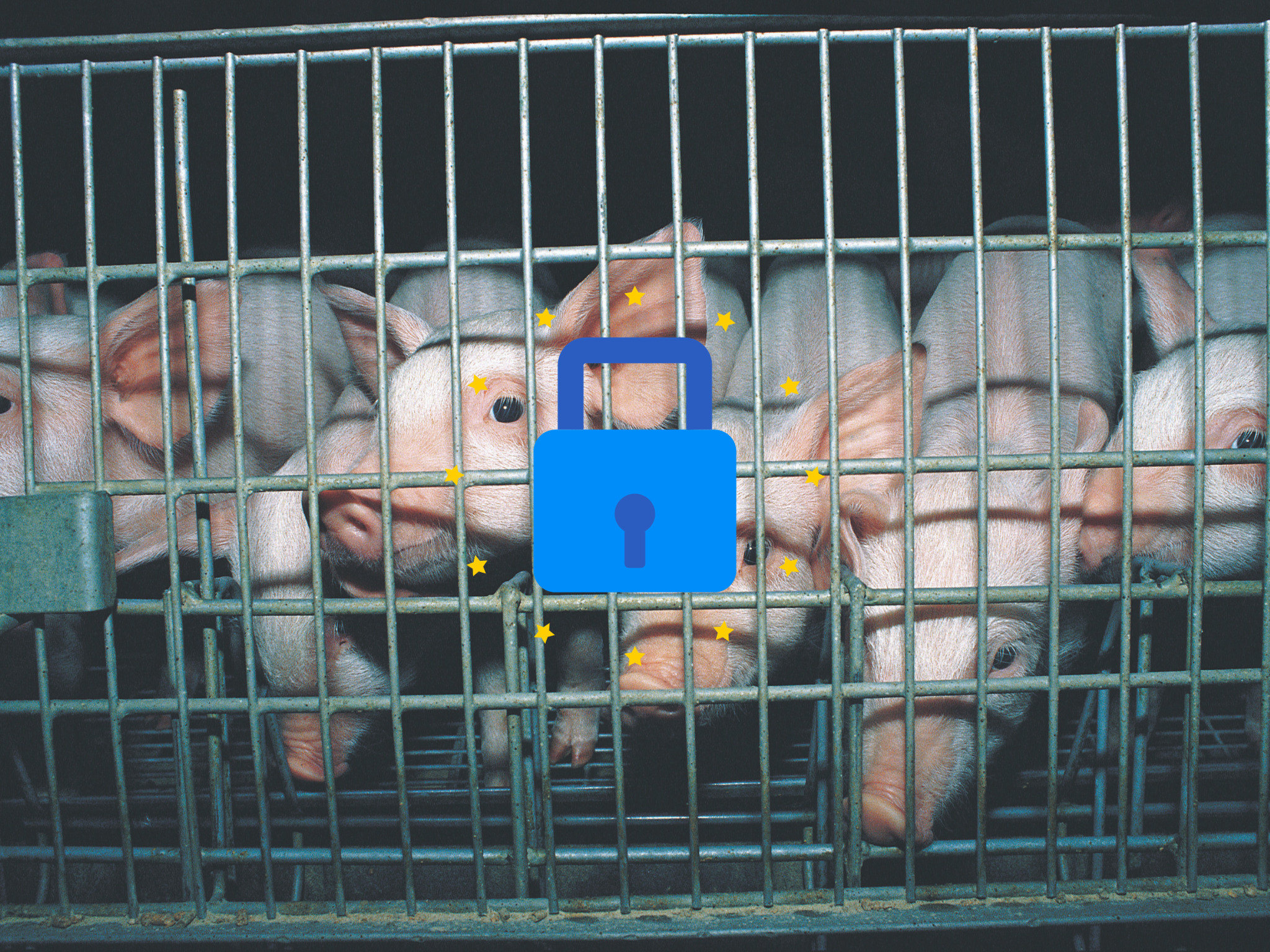The EU Caged Farming Ban is Now on Hold – Thanks to Aggressive Pressure from the Meat Lobby: Report
9 Mins Read
A new investigation has uncovered how meat lobby groups aggressively pushed back on a proposed EU ban on the caged farming of animals like hens and pigs, which has now been put on hold – despite the majority of EU citizens supporting the phaseout.
In 2021, the EU endorsed a resolution to ban caged farming, following a petition by 1.5 million Europeans. The EU Commission – the executive arm of the bloc – officially committed to set out a legislative proposal earlier this year, which was set to go through by the end of 2023.
These included four laws that would abolish acts like keeping farm animals in cages, slaughtering day-old chicks and the sale and production of fur. Last week, an EU survey found that 89% of citizens were still in support of the legislative action.
However, all but one of the proposals have been shelved from the EU Commission’s 2024 work programme, something that was hinted at last month. Now, a three-month-long joint investigation by the Guardian, Italy’s IrpiMedia, and a media consortium led by Lighthouse Reports has revealed that lobby groups connected to the meat industry campaigned to “undermine science, co-opt journalists and pressure officials at the EU” to influence the law and decision-making around it.
Unprecedented, intensive lobbying
Three EU officials allege that European Livestock Voice (ELV) and its partner associations pushed back aggressively to water down parts of the laws and attack scientific opinions that didn’t align with their goals. One has described it as the first time in a decade-long career that they felt such intensive pressure from a farming group.
Another said that the lobbying had put “really aggressive pressure” on the EU commission, which “enabled” the delay: “There was a strong presence of the industry on this file at different levels. There was a stream of negativity [from them]. All the dissuading arguments at a political level were built step-by-step by a set of very negative letters and positions and information that [industry] produced.”
They added that lobbyists “targeted senior levels in the commission” at strategic moments in the legislative process “using privileged channels”, after which attitudes from the hierarchy towards the issue became “extremely negative”.

This negativity was commonplace in DG AGRI, the EU Commission department responsible for agricultural policy, with environmental and welfare laws viewed as something to be resisted. “I couldn’t even say things like: ‘Agriculture has a large share in producing greenhouse gases,” recalled one ex-DG AGRI officer. “It was like: ‘Oh, no, I don’t bring that up.'”
Anja Hazekamp, vice-chair of the EU Parliament’s environment committee, said: “Industry fought really hard and dirty on this file. They tried everything they could think of because they know we desperately need animal welfare legislation to make our food system more sustainable and humane, and this was their last chance. They don’t want to change, but see that change is inevitable so they’re getting desperate. They will do anything to save their skins.”
Copa-Cogeca and EFSA backlash
Research has constantly shown that EU citizens care about animal farming regulations and are even willing to pay more for products obtained with higher welfare standards. This would entail providing animals with more space to move around, better housing conditions, and shorter journeys when transporting them. This didn’t fly with the industrial farming group Copa-Cogeca, which has deep ties with several centre-right MEPs to influence green legislation in the region.
In October 2021, ethical questions about livestock became a comms priority for the group, which gave birth to a targeted campaign seeking to impair the science, co-opt a journalist and coerce EU officials into abandoning the proposed bans.
Several lobby groups also submitted a 60-page report arguing that a positive assessment of the proposed legislation by the European Food Safety Authority (EFSA) was not “impartial” and contained “serious scientific errors”.

“This type of pressure on EFSA over a scientific outcome is always troubling,” said one EU official. They added that the analysis was aimed at “discrediting the work of the commission – the scientific work in particular – and complaining about a lack of transparency in the work done on economics and competitiveness”. Lobbyists argued that the ban would effectively destroy the region’s farming sector: “If the [animal welfare] bar will be raised very high, production will disappear from Europe.”
This was mirrored by another letter to the commission by Copa-Cogeca, which said the EFSA’s assessment would “lead to the loss of most of the European poultry sector, meat and eggs combined”. And one group accused the EFSA of bias and pushed for a corporate expert – “who was actually a senior researcher from a top American [poultry] producer” to be brought in to rewrite the ban: “It was amazing,” an EU official told the Guardian.
European Livestock Voice’s campaign
ELV – which Copa-Cogeca is a founding member of – was a notably active lobby group as well, established a year after the campaign to ban cages was launched. It was set up as an activist-style network and used NGO-like tactics such as flash mobs, Twitter campaigns, and social media organising.
Documents obtained through the Freedom of Information act showed that ELV partner associations urged EU officials to “resist the pressure from NGOs [as] NGO perspectives do not reflect the views of the broad public”.
Additionally, audio from an Animal Agriculture Alliance summit – a group with close ties to the US meat industry – hinted at ELV’s plans. Its campaign manager Andrea Bertaglio, told the audience: “We are all focused in Brussels at least, on the revision of the animal welfare legislation.” Bertaglio calls himself an environmental journalist, but told the summit that while that’s his “official identity”, “my real job now is to work to inform the public about livestock production”.
Part of the ELV’s approach is to question scientists, he added: “I’d like to go to the scientists. The ones publishing papers against meat… against livestock and say: ‘Why are you saying that? Data? Fact?’ So that’s the next step.”

In an interview with reporters investigating the story, he denied being a lobbyist and said he was simply transitioning from writing for newspapers to communication work. Thin Lei Win, one of the journalists for Lighthouse Reports, told Green Queen that he was asked in detail about his comments at that summit. In his response, he said he was trying to provide a balanced, broader picture, explaining how, for example, when the high water footprint of beef is mentioned, it’s not specified that most of this is rainwater.
“The livestock sector – I can tell you, because I’ve seen it now – is not questioning the fact that there is climate change or the human origin of climate change. And even not that a big part of emissions is coming from livestock. For many reasons, nobody’s denying that. So we’re not questioning science,” he told the reporters.
But, he added, there’s a difference between the majority of people agreeing that the primary cause of climate change is human activity, and those pinning the blame on livestock. “And there are ones and that’s a more balanced approach [sic] saying: ‘Okay, livestock is a part of the problem, but first, can be also part of the solution,” he said.
“So we’re saying exactly the same [thing]. Let’s focus on the real problems on livestock when we need to tackle climate change through livestock, but without forgetting all the rest,” he added. “It’s really easy nowadays to attack livestock. They’re not defending themselves. Because we say ‘lobby-lobby’. But finally, I tell you, they never invested anything in communication.”
The cost argument
ELV is not listed in the EU’s transparency register for lobby groups, and declined to comment on questions about how it’s funded, how it was set up, or its lobbying on the animal welfare package, according to the Guardian.
The deadline set by the EU to enforce the bans has now been missed, and apart from legislation on transportation due to be proposed before the end of the year, the rest have been scrapped from the Commission’s work programme for next year.
The Financial Times reported last month how the law was set to be dropped due to concerns about food prices and inflation. Green MEP Tilly Metz, who wrote an open letter to EU Commission president Ursula von der Leyen, told Lighthouse Reports: “For me, [the cost reason] is not valid. We are speaking here about sentient beings that are suffering, and we’re speaking of billions of animals. Even if I take the short-term economic perspective, yes, it will cost, but in the long term, we also save money because of the negative externalities intensive farming produces: pollution of the water, pollution of the soil, diseases, zoonoses.”

Lighthouse Reports asked animal rights groups about this argument too. Ola Kikou, European affairs manager at Compassion in World Farming, questioned: “It will cost farmers a lot more to keep the business as usual. Yes, there is a cost involved. But what is the cost of inaction? What is the cost of not doing anything?”
She added: “And besides the money questions, we as Europeans have certain values and we share some principles, including democratic principles, but also ethical principles. How ethical is it to keep animals suffering for years and years and not do anything when the citizens who voted all these people into office are expecting that they will do something? They never refer to the costs we are paying for inaction, for climate change, to keep all these animals suffering for endless time.”
Subsidies and pressure from EU member states
Animal lobby groups already hold sway when it comes to food funding in the EU, with livestock farmers receiving 1,200 times more funding than alt-protein producers. In fact, cattle farmers received at least 50% in direct subsidies from the EU. These groups have been found to undermine and push against climate legislation too.
But it’s not just the agricultural lobby that has been pressuring the EU on the cage-free proposal. EU member states have been involved as well. “In January 2023, Portugal suddenly presented an information note during the AGRIFISH Council [this is the meeting of all agriculture and fisheries ministers from member states] in which they called for a continuation of live animal exports. It was supported by eight other member states,” Lei Win told Green Queen.
“This was quite a turnaround from just six months earlier when the AGRIFISH Council saw a call from 13 member states for an ambitious revision of the Transport Regulation.”
Among the EU officials, Lighthouse Reports approached for comment was Danish socialist MEP Niels Fuglsang, who said that while the EU Parliament is democratically accountable – if we do something people don’t like, they can vote for somebody else – the EU Commission, “it seems to me, can do whatever they want”.
He added: “They have promised to put forward a revision of animal welfare laws, but they’re canceling it and we cannot do much. We can voice our opinion and we do but at the end of the day, they can say: ‘That’s all very interesting, but we’re not going to launch any proposals,’ and they are the only ones that can launch proposals. That’s a democratic problem.”




